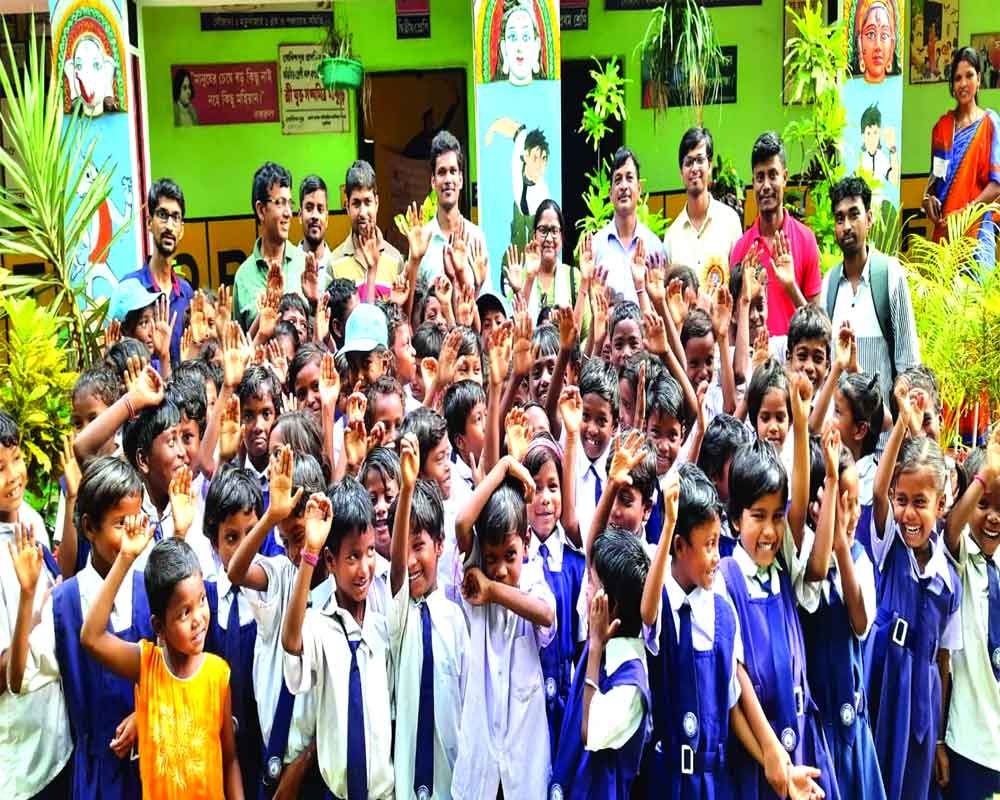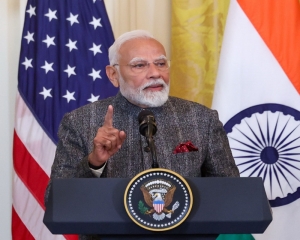Marang Pandit revitalises Gobindpur with education, sanitation, and sustainable practices. From dilapidated classrooms to model school, his leadership sparks social transformation in rural West Bengal, WRITES MOUSHUMI BASU
Fondly addressed as “Marang Pandit” (which means a great scholar in Santhali), Amitava Misra is not just the head teacher of a remote primary school in West Bengal’s Gobindpur village, but today, he is also the “guardian” to thousands of villagers in the region.
Back in April 2006, when then 35-year-old Misra took charge of the school in this tribal village of Purulia district, all he started with were two dilapidated mud-built rooms. A large banyan tree nearby served as the “classroom” under which a handful of children occasionally came to sit. The village lacked electricity and access to drinking water. Without an approach road to the village, a few spells of rain were enough to isolate it from its surroundings.
“But these situations did not perturb me as much as seeing villagers accustomed to open defecation, liquor addiction, and ignorance about basic health and nutrition," recalled Misra. However, within the next five or six years, the village made history by becoming one of the “Open Defecation Free” villages in the State with funding from the State Government. Each of the 240 homes in the village had its own toilet. In 2015, UNICEF recognised the village for its best practices in sanitation and hygiene and even produced a documentary film to highlight them.
Side by side, the village also received electricity. Tube wells were dug, providing villagers with access to clean drinking water, in addition to the construction of an approach road. The formerly crumbling Gobindpur primary school building was transformed into a solid structure surrounded by a boundary wall. Today, it boasts six classrooms, a library, and four toilets, along with a playground.
Winner of numerous teaching awards, including the 2018 National Teachers’ Award from the President of India and the State Shiksha Ratna, Misra's most formidable challenge, however, was gaining social acceptance among the villagers and integrating them into the social mainstream.
"I started by visiting door-to-door in the village to raise awareness among the villagers about health, hygiene, nutrition, and the importance of education," he said.
A handful of village youths were motivated by his initiatives, and together, they established adult education centres in the village. Initially reluctant, the villagers gradually started trickling into these centres, which soon became lively meeting places bustling with ideas and activities.
“More village youths came forward, and we organised into various groups,” said 27-year-old Suraj Hansda from the village. According to him, these groups became responsible for coordinating with respective State departments and urging them to carry out various works for village welfare and amenities. Misra particularly trained them to provide various services such as distributing oxygen cylinders, food, medicines, masks, sanitizers, and disinfecting villages during the COVID period.
According to the 65-year-old village elder Anant Manjhi, teachers had come and gone in the past, but they had hardly made any changes in their lives. “Today, our village is 100 per cent literate; we are aware of the importance of education,” he proudly asserted.
From sporadic attendance of 15-17 children back in 2006-07, today nearly 200 students from pre-nursery to Class 5 regularly attend the school. Funded by the Sarva Shiksha Mission, with contributions from local community members and also by Misra himself, the school now sustains three part-time teachers, mid-day meal cooks, and a gardener.
Furthermore, village women are trained in various livelihood options such as aquaculture, livestock rearing, mushroom cultivation, and weaving items out of locally available babui grass to generate additional income in households.
“I was touched by the beautiful bond shared between the students and teachers, as well as the involvement of local communities in various school activities,” said Proloyendu Bhoumick, District Inspector of Schools (Primary Education).
Gobindpur Primary School has emerged as a model school under the Total Literacy Mission (TLM), garnering 18 accolades. Prominent among these are the Jamini Roy Award (2015), the Best School Award in the State (2016), and the National Swachh Vidyalay Puraskar (2017), the latter presented by the then Union Minister of HRD, Prakash Javadekar, for excellence in water, sanitation, and hygiene in schools.
The school operates on solar power (1100 watts), which powers 24 fans, 8 LED bulbs, and other appliances. According to Bhoumick, teaching practices seamlessly blend traditional and modern techniques. The students are proficient in digital learning through projectors and computers. The training begins at the pre-primary level, where children are taught Bangla, English, and Math using digital calendars and pens. The school has hosted exposure visits for over 1000 teachers from different schools in the district, as well as educationists from Japan, in 2019 and 2023.
According to the TLM curriculum, the children also engage in nature studies and educational tours. The boundary walls of the school classrooms are adorned with mural art depicting teaching and learning materials, indigenous culture, wildlife, and forests.
“Environment and forests have always been very close to my heart,” said Misra. While the children and their parents have planted over 100 species of trees in and around the school campus and in the village, Misra has an innovative idea to combat plastic pollution.
“The children have been trained to make eco-bricks from plastic bottles,” he said. Plastic throwaway packets are collected from across the village, cut into small pieces, and compressed into these bottles, which, when tightly filled, are sealed together with mortar. These serve as replacements for conventional bricks in the school and the garden.
An accomplished writer and poet, Misra has authored 14 books in Bangla and contributed articles to various newspapers on a range of social issues and education.




























